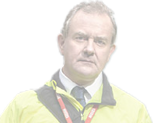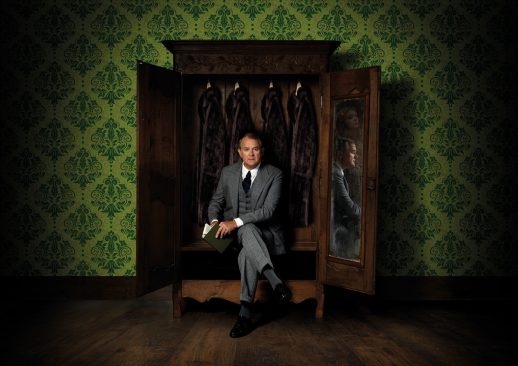Interview by Phil Hewitt for the Chichester Observer
Downton Abbey and Paddington star Hugh Bonneville warns that if you want to see Shadowlands, then you’re going to have to get to Chichester. It’s not going anywhere else.
The play, which opens the main-house summer season at Chichester Festival Theatre (April 26 -May 25), is Hugh’s first time back on stage since his leading role in An Enemy of the People at the CFT three years ago.
“I love working locally,” says Hugh who lives near Midhurst. “And this play won’t transfer for the same reason that An Enemy of The People didn’t transfer. I wanted to do a play just for this audience here. I didn’t want to be commuting to London or to New York. I wanted it to be something special for Chichester.”
As Hugh says, people said to him they missed An Enemy of The People because they waited for it to go into London. “The fact is that that was never going to happen, just as Shadowlands won’t be going anywhere else either.”
The CFT has got a vibrant, dynamic theatre community, and that’s who Hugh is wanting to play to. And he is promising a real rollercoaster of a story, a tale with plenty of humour, but above all a tale which will touch everyone who sees it.
William Nicholson’s play premiered in the West End in 1989. Originally a 1985 television drama, it became a feature film in 1993.
As Hugh says: “Shadowlands started as a TV play with Joss Ackland and Claire Bloom, and it came out of the documentary department at the BBC. And it was a huge success.
“I watched it a few years later because I had heard how beautiful it was. And then I got to work with Joss Ackland on a film, and I said to him how much I had enjoyed it. He said that of all the work he had done, Shadowlands was the one that came with the biggest postbag, the biggest response. But then, the themes are universal, the theme of loss which every one of us will experience.
“C.S. Lewis’ personal life is not something I knew a lot about, but it is brought to life in this play, and the story is profoundly touching – a story that will resonate with absolutely everyone.”
The Chronicles of Narnia author splits his time between an ordered domestic routine and the academic rigour of his dispassionate, all-male Oxford college.
“We have a man who is utterly assured of his place in the world and his faith in God and his certainty in his being a bachelor and the security of his whole bachelor world. And then into his life comes Joy Gresham, this spirited feisty New Yorker. She is a Jewish Communist Christian American, and in her search for Christian faith she read a lot about C.S. Lewis and started writing to him. He was a great correspondent.
“At one point she said she was coming to England with her son on vacation and could she meet up for a cup of tea. And that’s how the relationship started. Her marriage was falling apart, and to some in Lewis’ circle, she was a golddigger and wanting to get close to the throne, but to those that really knew him, she had a proper love and respect for him. But he didn’t know how to reciprocate. He was a closed-off man. His faith ebbed and flowed. His security was the world of ideas. And along comes Joy.
“But then ultimately the catalyst is when she falls gravely ill. They corresponded for several years, and she moved to Oxford and they married twice, once in a register office in order simply for her to be able to stay in Britain. But then when she got ill, he realised he was in love with her and wanted to marry her in the eyes of God. The Bishop of Oxford refused because she was a divorcee. This was the era of Princess Margaret not being allowed to marry Peter Townsend.
“But Jack – which was his nickname – was absolutely adamant that he wanted to marry her because she was dying. He found a priest who was prepared to do it and who was also known as a healer.
“And then she had this extraordinary recovery and remission that lasted not just a few weeks, but three years. And this man goes from being an extraordinarily closed-off emotionally-unsure man to developing a relationship with a woman which is really expressive and physical and romantic and utterly in love.”
For Hugh, the play is his first time back on the stage since his last time in Chichester in An Enemy of The People three years ago: “I really loved it and then when (CFT artistic director) Daniel (Evans) took over at the theatre, we had a chat about various possibilities and various plays.
“I can’t remember whether I suggested this or whether he did, but then I got the call from him saying that he had got the rights, and here we are.”
Since his last Chichester appearance, Hugh has had the huge big-screen pleasure of Paddington 2, a sequel which many people rate even higher than the first instalment. Hugh is with them on that.
However, he admits he had his doubts: “I was not sure that we would get away with it twice, and I wasn’t sure that keeping the family away from the bear for so much of the film would work. But that shows how much I know about film-writing!
“But I do think it was better than the first one. I think the tone of it was more Michael Bond. I thought Nicole Kidman was fantastic in the first one, but to have a protagonist that wants to stuff and mount the bear was not terribly Michael Bond! But instead (in Paddington 2), we have got this wonderful vain and pompous performance by Hugh Grant, which is brilliant. And I just think that (director and writer) Paul King has got such tremendous wit and humanity. The sense of the genuine inclusivity of the human spirit is there.”
As for a third Paddington: “We would have to have the right script. They are not looking for the cash cow. It is not like a three-picture deal and we have got to deliver the third one.
“In the great scheme of things we have delivered two terrific films, and if there is a third one, then great, but the script has got to be right.”
Tickets on cft.org.uk









